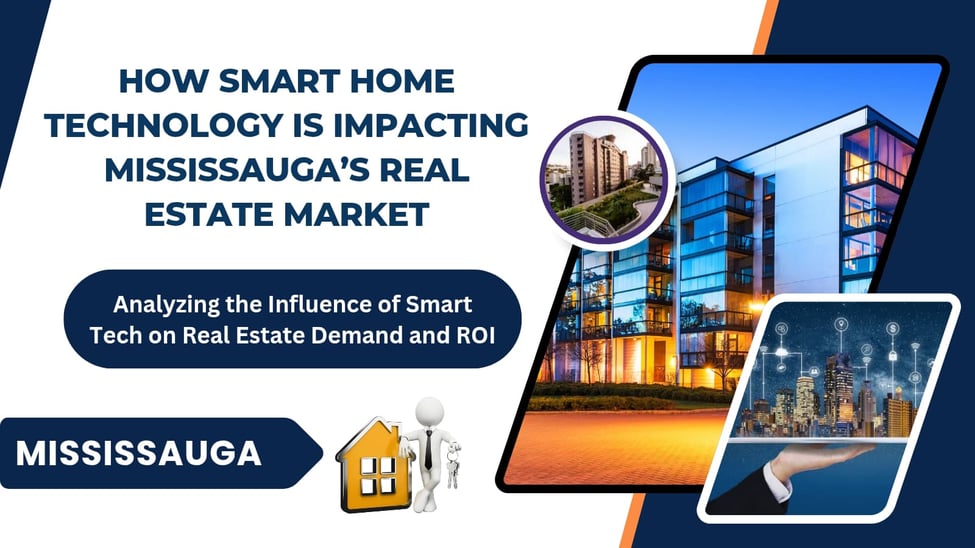In recent years, smart home technology has transitioned from a luxury to a standard expectation among homebuyers. In Mississauga, a city known for its rapid growth and diverse population, the integration of smart technology in homes is not just a trend—it's reshaping the real estate landscape. This comprehensive analysis delves into how smart home features are influencing buyer preferences, property values, and investment returns in Mississauga's dynamic market.
Understanding Smart Home Technology
Smart home technology encompasses a range of devices and systems that automate and enhance various aspects of home living. These technologies offer homeowners increased control, efficiency, and security. Key components include:
Smart Thermostats: Devices like Nest and Ecobee allow for remote temperature control, learning user habits to optimize energy use.
Voice-Controlled Assistants: Platforms such as Amazon Alexa and Google Assistant enable voice-activated control of various home functions.
Smart Lighting Systems: Automated lighting solutions that can be controlled remotely or set on schedules.
Advanced Security Systems: Including smart locks, doorbell cameras, and motion detectors that provide real-time alerts and remote monitoring.
Energy Management Systems: Tools that monitor and optimize energy consumption, contributing to sustainability and cost savings.
The Rising Demand for Smart Homes in Mississauga
Mississauga's real estate market is experiencing a surge in demand for homes equipped with smart technology. Several factors contribute to this trend:
1. Tech-Savvy Population
Mississauga boasts a diverse and educated population, many of whom are professionals in tech-related fields. This demographic is more inclined to appreciate and seek out homes with integrated smart technologies.
2. Energy Efficiency and Sustainability
With increasing awareness of environmental issues, buyers are prioritizing homes that offer energy-efficient solutions. Smart thermostats and energy management systems not only reduce carbon footprints but also lead to significant cost savings.
3. Enhanced Security Concerns
Safety remains a top priority for homeowners. Smart security systems provide real-time monitoring and alerts, offering peace of mind and an added layer of protection.
4. Remote Work and Lifestyle Changes
The shift towards remote work has led buyers to seek homes that can accommodate their new lifestyles. Smart home offices, automated lighting, and climate control systems enhance comfort and productivity.
Impact on Property Values and ROI
Investing in smart home technology can lead to appreciable returns:
Increased Property Value: Homes with smart features often command higher prices, as buyers are willing to pay premiums for enhanced convenience and efficiency.
Faster Sales: Properties equipped with smart technologies tend to sell more quickly, as they stand out in listings and meet the modern buyer's expectations.
Attractive to Younger Buyers: Millennials and Gen Z buyers, who are entering the housing market in greater numbers, prioritize technology integration in their purchasing decisions.
Key Smart Features Driving Buyer Interest
Certain smart home features are particularly influential in attracting buyers:
Smart Thermostats: Offer energy savings and personalized comfort.
Automated Lighting: Enhances ambiance and security while reducing energy consumption.
Smart Security Systems: Provide real-time surveillance and control, increasing the sense of safety.
Voice-Controlled Assistants: Facilitate hands-free control of various home functions.
Energy Monitoring Devices: Allow homeowners to track and optimize their energy usage.
Considerations for Homeowners and Sellers
While integrating smart technology offers numerous benefits, homeowners should consider the following:
Compatibility: Ensure that new devices are compatible with existing systems to avoid integration issues.
Privacy and Security: Protecting personal data is paramount; choose devices with robust security features.
Maintenance: Regular updates and maintenance are necessary to keep systems functioning optimally.
Cost-Benefit Analysis: Evaluate the return on investment for each smart feature to ensure financial viability.
Future Outlook: Smart Homes in Mississauga
The trajectory of smart home technology in Mississauga's real estate market is poised for continued growth:
Standardization: As demand increases, smart features may become standard in new constructions.
Integration with City Infrastructure: Potential for homes to connect with broader smart city initiatives, enhancing overall efficiency and connectivity.
Advancements in AI: Future developments may lead to more intuitive and responsive home systems, further increasing their appeal.
Conclusion
The integration of smart home technology is significantly influencing Mississauga's real estate market. For buyers, these features offer enhanced convenience, security, and efficiency. For sellers and investors, they present opportunities to increase property value and appeal. As technology continues to evolve, embracing smart home innovations will be key to staying competitive in Mississauga's dynamic housing landscape.

